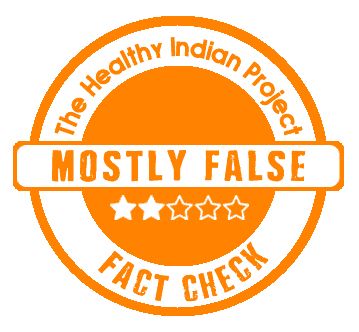Last Updated on May 1, 2023 by Neelam Singh
Quick Take
A social media post claims that bee venom can slow down and kill cancerous cells. Therefore, if someone is suffering from cancer, they should go get stung by a bee. We fact-checked and found this claim to be Mostly False.

The Claim
A Facebook post reads, “If you have cancer, go get stung by a bee. The venom can slow down and kill cancerous cells. Look it up, no cap !”

Fact Check
Is being stung by a bee a viable cure for cancer that cancer patients should consider?
No. Even though there are certain elements found in bee venom to have anti-cancer properties, there is a lack of research proving that it can eliminate cancer.
A study found that bee venom can control the metastasis of breast cancer cells and lower cell viability. Thus, can be a potential therapeutic agent. But, the study also mentions that it carries a worrisome hemolytic side effect, which can only be managed by adjusting the dose, which can’t happen if a person self-medicates with the venom.
Another study found that there is an enormous bioactive potential of honeybee venom for colon and breast cancer treatments, both alone and in combination with chemotherapy or repurposed drugs. Similar results were also found for pancreatic cancer.
The claimant suggests that cancer patients should undergo bee stings as a cure, but there is no scientific evidence to support this claim. Also, the research is limited to certain types of cancer and can’t be generalized without further in-depth research.
What research has shown is that bee venom contains certain components that may have the potential to be developed into anti-tumour drugs. While it is true that honey bee venom has some anticancer properties, these specific components must be carefully extracted by an expert and administered in the appropriate dosage, which cannot be done by a layperson. Therefore, it is not safe or advisable for cancer patients to rely on bee stings as a substitute for evidence-based medical treatments.
Why does depending on such remedies dangerous for a cancer patient?
Because these remedies are often promoted by individuals without medical training, and their use can delay or even prevent cancer patients from receiving proper medical treatment that has been proven to be effective. Furthermore, some of these remedies can have harmful side effects, as bee stings can cause allergic reactions, ranging from mild to severe, in some people. In rare cases, bee stings can cause a life-threatening condition called anaphylactic shock. Also, it may interact with cancer treatments, potentially leading to further health complications. It is always important for cancer patients to rely on evidence-based treatments recommended by their healthcare providers and to avoid unproven remedies that could put their health at risk.
Disclaimer: Medical Science is an ever evolving field. We strive to keep this page updated. In case you notice any discrepancy in the content, please inform us at [email protected]. You can futher read our Correction Policy here. Never disregard professional medical advice or delay seeking medical treatment because of something you have read on or accessed through this website or it's social media channels. Read our Full Disclaimer Here for further information.

